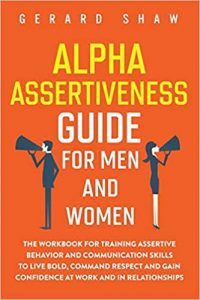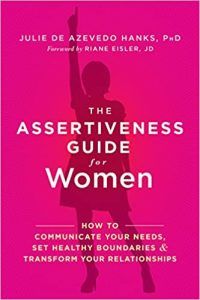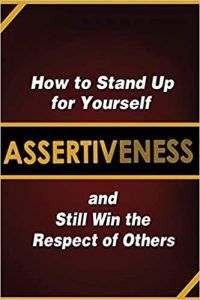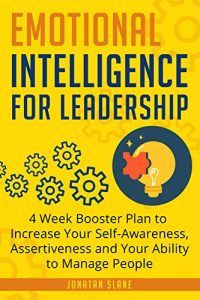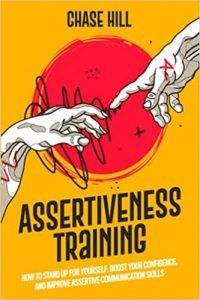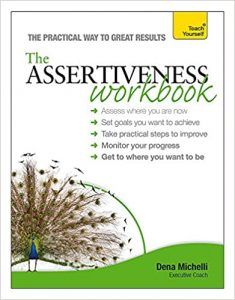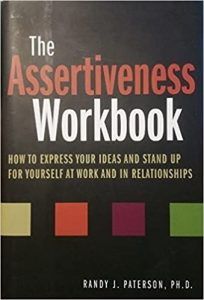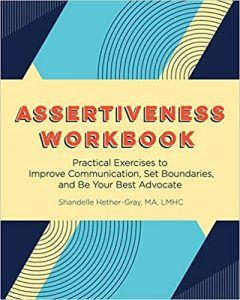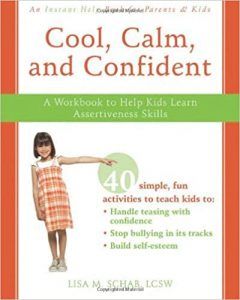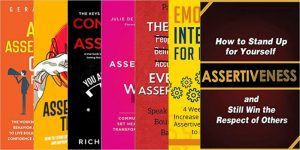
to please other people, do you agree with them even though it’s not in your best interest?
You are reading: Best books on assertiveness
If these statements apply to you, you may have a hard time being assertive.
assertiveness training is designed specifically for people who have trouble communicating their needs. It begins by enhancing an individual’s beliefs through the development of self-esteem and self-confidence.
In addition, assertiveness training focuses on emotional awareness, which results in people having more satisfying personal relationships and feeling more secure (Parray & Kumar, 2017).
This article presents a selection of books that explain the concept of assertive behavior and communication. also recommends workbooks and exercises to improve your ability to communicate more assertively.
Before we continue, we thought you might like to download our three resiliency exercises for free. These engaging, science-based exercises will help you effectively deal with difficult circumstances, be more assertive, and give you the tools to improve the resilience of your clients, students, or employees.
8 assertiveness books
we offer a modest selection of eight books to choose from. To help you choose one that resonates with you personally, an overview of each is included.
1. the keys to being brilliantly confident and more assertive – richard banks
This book provides a comprehensive definition of assertiveness and breaks down the specific techniques you need to become more assertive.
includes practical steps for assertiveness and easy-to-access headings to help readers focus on the areas they’re having trouble with.
The main focus of the book is communication skills. emphasis is placed on reducing awkwardness when talking to people, managing difficult conversations, and dealing with conflicts.
This focus on communication makes the book ideal for people struggling with social-emotional issues and social difficulties. includes strategies that can help people gain confidence in social situations.
look for the book on amazon.
2. alpha assertiveness guide for men and women – gerard shaw
This guide is intended to help readers feel more comfortable asking for what they want and getting it.
provides several resources to discover the more confident side of your personality, including a self-assessment quiz to discover what type of communication is best for you and a guide to possible personal strengths that can be applied to different situations.
Specifically, the guide breaks down ways to say “no” effectively. saying ‘no’ can be difficult for people who struggle to be assertive. the guide emphasizes the importance of saying ‘no’ and provides a variety of strategies, from simply saying ‘no’ to a more polite ‘not this time’, depending on the situation.
This book is ideal for people who have specific difficulties in taking on too many responsibilities and need more information about their personality type to implement assertive behaviors in their responses.
look for the book on amazon.
3. the assertiveness guide for women – julie de azevedo hanks
Although being assertive is a skill anyone can master, this book looks at the specific challenges women face around developing assertiveness. more specifically, the book states that if you’re prone to anxiety or avoidance, it’s hard to be assertive.
The book introduces strategies to help facilitate assertiveness, such as mindfulness, cognitive behavioral therapy, and dialectical behavior therapy. it also documents different communication styles (such as the passive, aggressive, and passive-aggressive doormat).
By understanding your communication style, you can apply emotional awareness skills. the goal of the book is to avoid a cycle of regret for not being able to express yourself.
look for the book on amazon.
4. the art of everyday assertiveness: speaking. say no set limits. regain control. – patrician king
king, who is a prolific life coach, classifies himself as a recovering people pleaser and provides advice based on his experience with clients as well as his own personal struggles.
Her writing guides readers to combat the compulsions they feel to overindulge and sacrifice their own happiness for the good of others by using a 28-Day Assertiveness Action Plan.
Readers are encouraged to document their people-pleasing behaviors (eg, overly apologetic, overly accommodating, and overcomplying) and set goals to overcome these behaviors.
king focuses on examining the subconscious patterns and beliefs that might govern these behaviors and encourages readers to delve into the origins of the people-pleasing behavior that causes them distress.
See Also: How Many Books Are Published Each Year? [2022 Statistics] – Toner Buzz
This book would be ideal for people who have already done self-awareness exercises and know that this behavior is somewhat ingrained in previous settings (eg, childhood, school, or among a group of toxic friends).
Recognizing the behaviors that lead to people-pleasing behavior is the first step in recognizing the action you need to take to bolster your self-esteem.
look for the book on amazon.
5. assertiveness: how to stand up for yourself and earn the respect of others – judy murphy
This book is written simply and the message of being assertive and standing up for yourself is clearly conveyed. provides you with an easy classification tool, where readers can categorize their everyday behaviors as “passive” or “assertive”.
Beyond the classification tool, murphy provides practical strategies to use in group or individual settings so that readers can express their needs in a healthy and clear way.
This book is recommended for people looking for a quick read on how to develop assertive behavior. would be ideal for teens and young adults who may be struggling and need a comprehensive introduction to expressing themselves assertively.
look for the book on amazon.
6. assertiveness: how to be strong in every situation – conrad potts and suzanne potts
Taking a more practical approach, this book provides specific strategies for overcoming everyday challenges. uses examples of different situations that readers may struggle with when practicing assertiveness.
Different situations covered in the book include business challenges (eg, asking for a raise), family (eg, saying no to favors), and social gatherings (eg, setting boundaries). regarding plans).
Chapters in the book are arranged by situation, allowing readers to access an example situation that applies to them. each chapter has a summary of the situation, a real-life example, and different strategies and activities to help deal with those problems.
The breakdown of each situation makes this book ideal for people who struggle with specific situations and need practical solutions to implement in their daily lives.
look for the book on amazon.
7. emotional intelligence for leadership – jonatan slane
This book provides a specific approach to developing assertiveness using a four-week plan. focuses specifically on the importance of emotional intelligence and examines the correlation between emotional intelligence, personal satisfaction, and career success.
also provides a compelling argument for increasing assertiveness in the workplace, emphasizing that employers are more likely to promote an emotionally intelligent employee than an employee with a high IQ (slane, 2019).
Because being assertive is part of having strong emotional intelligence, developing the ability to express yourself and defend yourself in group settings is key to being more successful.
Although this book provides strategies for both professional and personal development, it is geared toward developing positive leadership skills. This book is ideal for people in leadership positions who are looking to be more assertive with others in the workplace.
look for the book on amazon.
8. assertiveness training: how to stand up for yourself, increase your confidence and improve assertive communication skills – chase hill
This book provides specific parameters for people to identify the barriers that prevent them from acting assertively. these behaviors include being passive and being more focused on making other people happy.
To help people who struggle with assertiveness, Hill suggests that readers develop emotional control and self-awareness.
Developing these skills will help people deal with anxiety and fear. instead of reacting hesitantly, they will be able to approach situations assertively, creating healthy boundaries that will allow for greater productivity.
look for the book on amazon.
top 4 workbooks for assertiveness training
Focusing on assertiveness can often be difficult, especially if you’re not sure how to develop this skill in everyday life. may understand and know what assertiveness is, but not know how to develop the skills to exhibit it in everyday life.
workbooks provide a practical approach to developing a specific skill, such as assertiveness. Below, we’ve provided a selection of workbooks that have practical strategies for building assertiveness.
1. the assertiveness exercise book – dena michelli
This workbook provides readers with diagnostic tools, goal-setting charts, and practical exercises to build assertiveness. what makes this workbook useful is that it promotes an active style of learning.
The first activity invites readers to identify their preferred learning styles, and activities are provided based on the learning style you identify with. this allows readers to choose the activities that work best for them and to match the activities to the way they learn.
look for the book on amazon.
2. The Assertiveness Workbook – Randy J. paterson
This workbook focuses on using assertiveness in the workplace and in personal relationships. paterson provides specific strategies for people to communicate their needs effectively in both settings and make your readers more comfortable setting personal boundaries.
In addition, this book also provides several cognitive behavioral therapy (CBT) strategies to combine with assertiveness training. These strategies include having readers write down possible reactions to situations, documenting things that cause them anxiety, and understanding how all-or-nothing thinking can contribute to passivity.
Combining CBT strategies with assertiveness training can be helpful in a therapy session, especially for those already receiving treatment for anxiety or other related conditions.
look for the book on amazon.
3. assertiveness workbook – shandelle hether-gray
This workbook examines the impact of healthy and unhealthy communication styles on assertive behavior and provides readers with guidance on how to be more communicative in situations.
The strategies hether-gray provides are based on building the reader’s confidence so that they are better able to deal with difficult situations.
In addition, this workbook provides scripts that you can use with your therapist, alone, or with a friend to practice specific communication skills that promote assertiveness. the scripts make this book very useful for people who have social anxiety or who struggle with social interaction, as they can simulate situations in a safe environment.
look for the book on amazon.
4. Cool, Calm, and Confident: A Workbook to Help Kids Learn Assertiveness Skills – Lisa M. shab
Designed specifically for children and their parents, this workbook gives children the tools they need to be more assertive in their daily lives.
according to schab (2009), children who are more assertive are more resilient and more likely to defend themselves when they experience conflict with other children.
To help children become more assertive, the book offers simple explanations to help them understand the difference between passive and aggressive behavior.
also provides strategies to discourage teasing (e.g., walking away and using simple, short statements to reaffirm boundaries) and teaches self-regulation strategies to manage anger and anxiety surrounding difficult situations.
This book is great for older kids struggling with bullying, as that’s often where kids need to be assertive first. It would also be a great resource for parents who have young children who are being bullied, as they can guide their children through the strategies the book offers.
look for the book on amazon.
resources from positivepsychology.com
There are several resources available on our website for people looking to be more assertive in their everyday lives or in the workplace.
Several of the most practical resources for developing assertiveness include worksheets and activities. Here’s a breakdown of the most relevant resources:
- assertive communication classifies the specific characteristics of aggressive, assertive, and passive communication for people looking to learn more about what each communication style looks like.
- speaking assertively provides more detailed statements that people can use in different contexts to communicate assertively.
- sometimes there are innate things that can prevent us from practicing assertiveness. obstacles to assertiveness establishes specific barriers that prevent an individual from being assertive in different situations. The worksheet then challenges these common assumptions and provides reasons why people should still practice assertive communication.
- Ever wonder what to consider when looking for signs that you should be more assertive? self-assessment questions for assertiveness provide yes or no questions that look at whether or not you would benefit from assertiveness training.
Our website also has several great articles on the power of being assertive. What is assertiveness in psychology? provides a comprehensive definition of assertiveness from a psychological perspective, with five examples.
what is assertive communication? summarizes assertive communication in children and in the workplace. it also provides several examples that you can use to help develop your communication skills or for training purposes if you are running a workshop.
If you’re looking for more science-based ways to help others communicate better, this collection contains 17 validated positive communication tools for professionals. use them to help others improve their communication skills and form deeper, more positive relationships.
a message to take home
Although assertiveness can be difficult to master, it is an extremely valuable skill in helping you communicate your needs clearly and concisely.
It is important to remember that assertiveness and aggression are not synonymous. While assertiveness can sometimes be confused with aggressiveness, assertiveness aims to remove the negative emotions that stem from aggression and focus on expressing your opinion with confidence.
Developing the skills to communicate what you want without being aggressive, feeling guilty or flooded with negative emotions is key to living a happier and more fulfilling life. We hope this article provides you with an introduction to resources to educate yourself on assertiveness training and useful workbooks with exercises that you can implement in your daily activities.
so what are you waiting for? start putting your best and most confident foot forward. you deserve it.
We hope you enjoyed reading this article. Don’t forget to download our three free resilience exercises.
See Also: 12 Exciting Bug Books For Kids
